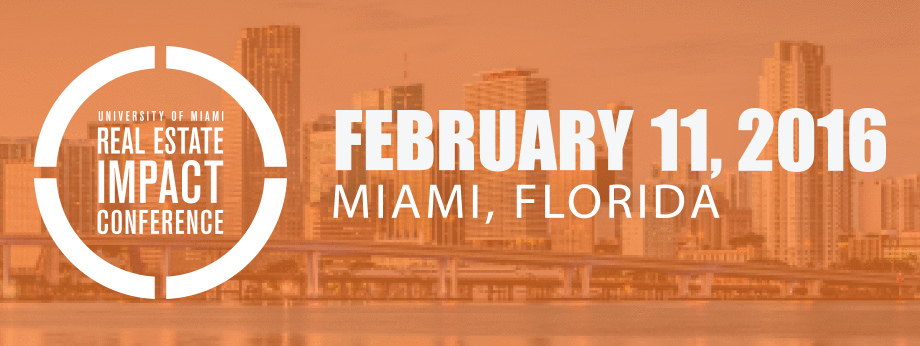
View Photo Gallery
About 600 professionals gathered to network with national industry experts and glean perspectives on South Florida’s real estate market at the University of Miami’s fifth annual Real Estate Impact Conference on Feb. 11. The conference, hosted by the School of Architecture and the School of Business, took a long-term and global view of factors impacting commercial real estate from Millennials to retail to smart cities and beyond.
View videos and read session papers
  |
| Jon Gray, global head of real estate at The Blackstone Group, headline the conference as the keynote speaker. |
The day kicked off with the Swire Scholars Luncheon, which brought together students from the Master of Real Estate Development and Urbanism program at UMSoA, students from the SBA’s Real Estate program, and board members for each program, to network and discuss the state of real estate in South Florida. Steve Owen, CEO of Swire Properties, addressed the luncheon to start things off.
The keynote session featured Jon Gray, global head of real estate for the Blackstone Group. Gray’s bottom line about Miami: “We love great cities where people love to work and visit and travel. Miami clearly qualifies. It’s a gateway to Latin America and the city keeps getting better and better. In Miami in particular, we’d like to try to buy real estate in a period of volatility and hold it for long periods of time.”
During the How Millennials are Driving the Transformation of the Real Estate Investment Market panel Manny de Zarraga, executive managing director of HFF, moderated a discussion about the most important Millennial trends for investors and lenders. “Retail is deeply in love with Millennials. The problem is it’s unrequited love because they don’t spend any money,” said Garrick Brown, vice president of Retail Research of the Americas at Cushman & Wakefield. “Millennials are the biggest consumer block now at 87 million and everyone is chasing them. It’s causing changes in the commercial real estate landscape.”
Indeed, there is no lack of research on what Millennials want from living space, office space and more. Brown says some of that research may be accurate and some may not but of one thing he is sure: Today’s preferences are not permanent. What Millennials want today will change in five or 10 years as they mature.
In a discussion called A Fresh Look at Retail, Steve Witkoff, CEO of The Witkoff Group, interviewed Donald Wood, president and CEO of Federal Realty Investment Trust. They discussed topics ranging from open air and closed mall development, targeting cities or suburbs and public versus private ownership.
  |
| Panelists discussing how millennials are driving the transformation of the real estate investment market. |
Witkoff kicked off the interview with a broad brush of global realities: “We’re seeing U.S. GDP growth. The dollar is strong. Many economists talk about the U.S. consumer as being the difference between 2 percentGDP growth and a possible recession. Some are saying the likelihood of a recession has risen to 30 percent in 2016.”
Wood, whose firm has made big bets on CocoWalk and The Shops at Sunset Place in South Florida, isn’t looking at 2016 as much as he’s looking at 2023 and 2028. That’s because the capital his firm deploys on any project or initiative isn’t influenced as much by what is happening in the economy today as much as it is on cycles, location and product.
“What we are seeing suggests a continued migration to urban areas from suburban and more rural areas,” Wood said. “Everybody has a different definition of urban. For some it means downtown—ground zero. For others it means Coconut Grove or South Miami. Consumers, from our view, are clearly coming in closer.”
The Smart Cities: Technological Change in Real Estate panel, hosted by School of Architecture Dean Rodolphe el-Khoury, focused on what happens when tech giants, innovative cities, and real estate entrepreneurs collide. “We are trying to figure out who are the companies that five or 10 years out will define what cities look like,” said Shaun Abrahamson, CEO and co-founder of venture fund Urban.Us Public Benefit Corporation. “We are tracking a set of 400 companies that are private, early stage and growing at a decent rate. What’s the state of urban tech? A lot of people think about smart cities in terms of things governments buy. That’s a tiny percent.”
The annual Real Estate Impact Conference was presented in 2016 by Douglas Elliman Real Estate, the Kislak Foundation and The Witkoff Group.
Media Coverage
South Florida Business Journal
The Real Deal
Daily Business Review
GlobeStreet.com (UM Real Estate Programs)
GlobeStreet.com (Conference/Real Estate and Technology)
South Florida Business Journal (Pre-Conference)
CityBizList (Pre-Conference)








